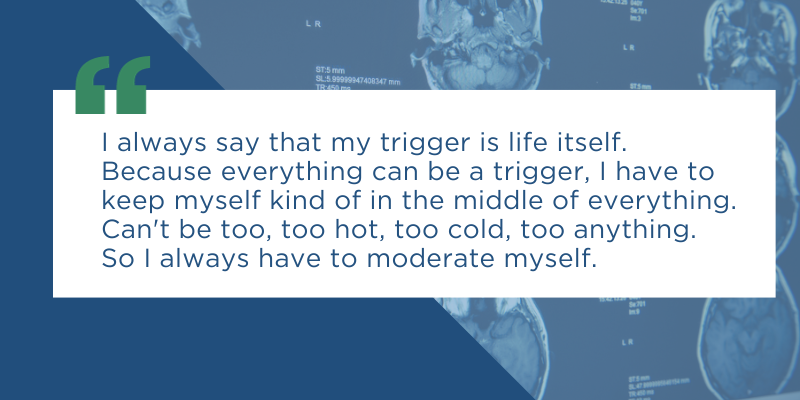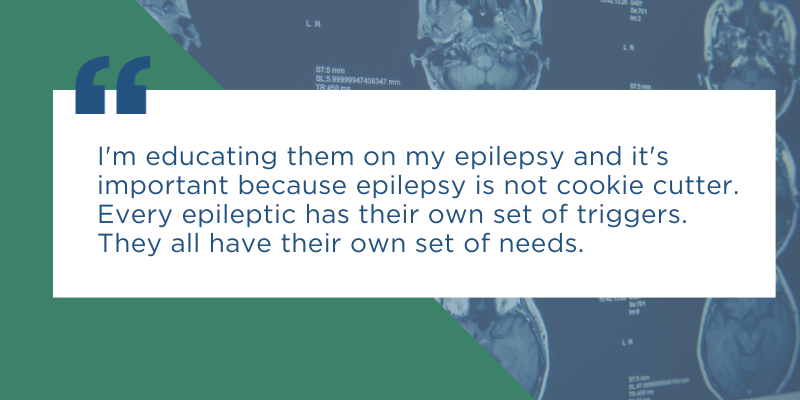Marcia Raphael Says Her Condition Isn’t ‘Cookie Cutter’
Lei Keches Senior Paralegal Marcia Raphael was born with epilepsy and has faced and overcome obstacles her whole life. She became a paralegal after being fired from her job just for having epilepsy. She fought for her rights, fell in love with the work and pursued a career in law. Recently, she took a few minutes to talk about what her life is like with the neurological condition, and what she wishes others knew about epilepsy.
Mark Burridge
Hi, Marcia.
Marcia Raphael
Hi, how’re you doing?
Mark Burridge
Can you tell me a little about yourself?
Marcia Raphael
So my name is Marcia Raphael. I am a senior paralegal at Keches Law Group. I’ve been here for four years now and I’m an epileptic.


Mark Burridge
Can you describe what epilepsy is and how it affects you on a day-to-day basis?
Marcia Raphael
So epilepsy, in a nutshell, is an overactivity in the brain that causes reoccurring seizures and how it affects me on a day-to-day basis is that I have to always watch how all of my activities are, like, it affects everything that I do. I have triggers and they cause symptoms, so I have seizures that are tonic-clonic and those are convulsive seizures. I have those about once a month, and then I have the absence seizures, which can happen about 16 times a day, and that’s with medication.
With that, those seizures themselves cause symptoms. So even though you’re seeing the seizure, it can cause fatigue, it can cause confusion, it can cause body aches. It can cause a whole bunch of things that I have to navigate in my daily life. So not only am I navigating my triggers, I’m also navigating the symptoms of the seizures. And then with regard to the triggers, triggers are everywhere in life. I always say that my trigger is life itself. Because everything can be a trigger, I have to keep myself kind of in the middle of everything. Can’t be too, too hot, too cold, too anything. So I always have to moderate myself.
Mark Burridge
What would happen if you didn’t have medication?
Marcia Raphael
I would have uncontrolled seizures, so that would mean that I would just seize without limitation. And unfortunately, that could have detrimental consequences.
Mark Burridge
Can you tell me about the different types of seizures you experience?
Marcia Raphael
So I have tonic-clonic and I have absence seizures. So tonic-clonic are the convulsive seizures where again part of you becomes rigid in some way. So let me take a step back.
Generalized epilepsy means that you have seizures on both sides of your brain, so you become absent in your brain. You’re like, not present. So the tonic-clonic means that you’re not present, but you’re also becoming rigid in some way, and usually a part of you is twitching or convulsing. And usually, it’s just you’re a complete convulsive seizure. But it can be just a partial convulsive on one part of your body.
And then there’s absence seizures where it can be, can last anywhere from like 10 seconds to 60 seconds. And those are harder to tell and a lot of times I have to accommodate those kind of things because when I have conversations, people don’t realize I’m having them. And I have to fill in the gaps of what they’re talking about or ask them to repeat what they’re saying and explain that I’m not trying to ignore them.
I’m literally just, I missed something that they were saying because to me it’s like a blink. It wasn’t even a couple of seconds. It was me blinking. Sometimes they even walk away and I don’t even realize, it’s like magic. The person just disappeared to me. So it really is a polarizing kind of experience because to them, I’m just standing there, not responding, and it can be kind of like I’m ignoring them, but to me it was just a blink.
Mark Burridge
Does epilepsy affect you even while you’re relaxing.
Marcia Raphael
It does, so, as I said, I have to moderate myself. I can never be too much of anything. So if I’m too excited or too relaxed, it does affect me. So even when I’m relaxing watching TV, reading or something. I tend to try and still do other things to occupy myself in some way, because otherwise I have increased absence seizures.
So there literally is no way for me to be too much of anything. I always have to live in the middle. So again, if I’m too cold, too hot, too stressed, too anything, I have to really moderate myself and live in the middle of everything.
Mark Burridge
Do you feel like people understand what epilepsy is?
Marcia Raphael
No, I do not think that people understand what epilepsy is. I think that people have an idea from maybe TV or hearing about epilepsy. They specifically think that epilepsy simply is like tonic-clonic seizures. The convulsive seizures, that’s their main idea of what seizures are and then they might think of like the basic triggers of like the flashing lights. Maybe noise causing some kind of epileptic episode, but for the most part, that’s all that they really understand. There’s so many different types of epilepsy that the ones that are absent or partials, they forget that those exist. And those are just as important as the convulsive seizures.
And then the actual seizure, like I said, is not the only part of being an epileptic. It is the symptoms that are involved after the aftercare because there’s a lot of times that the symptoms last days or weeks and we have to deal with the aftermath of that for so long that it, it matters.


Mark Burridge
How important is it to educate the people around you about epilepsy?
Marcia Raphael
Oh, it’s imperative. I find it imperative for myself anyway, because of my safety. By educating people, it’s creating a conversation that I’m educating them on my epilepsy and it’s important because epilepsy is not a cookie cutter disorder. Every epileptic has their own set of triggers. They all have their own set of needs. So if they try to give care to me, that might be for someone else with epilepsy, it might be detrimental to me again. So it’s very important for me to educate the people that are around me on a daily basis on what I actually need and it’s imperative that we have that kind of conversation. So and also it’s imperative for their safety as well, because if they try and do something that might be like restraining me in some way, I could hurt them as well and I don’t want to do that. So the conversation is needed so that both parties are safe.
>> Keches Law Lawyers Offer Advice to Law Students, New Attorneys
Mark Burridge
What made you get into the legal field?
Marcia Raphael
So in my past when I was working, I experienced some discrimination. Specifically, I was let go because I was an epileptic, and I realized that, that was a violation of my rights.
No one told me explicitly that it was, but I had a feeling that it was, and I decided to do my own research, and upon doing my research, I contacted the Massachusetts Commission Against Discrimination and I fought it all the way through, and that’s what made me learn to love the law because I realized that there’s people out there that don’t understand that they have rights and I wanted to make sure that other people’s rights weren’t violated in some way. So I just learned to love the law because of that.
Mark Burridge
How has your experience been at Keches Law?
Marcia Raphael
My experience at Keches Law Group has been refreshing, to say the least, and I don’t say that lightly.
I have worked at different places and I really do feel like, not only with management, I’m talking about on a pure level, people have been very open with dealing with me and my epilepsy and wanting to communicate and learn. And then on the management side with dealing with my direct attorney, with dealing with HR, again, there’s been an open communication about wanting to learn, wanting to educate people, wanting to make sure that I have whatever accommodations that I need.
It’s been very refreshing and very inclusive because I really believe that Keches Law Group is looking to be inclusive.
>> Keches Law Gets High Marks from Best Law Firms ®
Mark Burridge
When you’re outside of work, what do you like to do?
Marcia Raphael
So of course I love being with my family, but you know, I’m a nerd. I like Star Trek. I love the MCU. I love DC Comics and all that kind of stuff. So I watch a lot of those things. I read. I love Harry Potter, so I’m a Potterhead and that’s just of what I do on top of cooking and things like that for my family and friends, because that’s what I love to do.
Again, I go back to if I you know, watch TV specifically the MCU, because I love Marvel Comics. I love watching like Doctor Strange and Spiderman. I couldn’t watch the last couple of movies because specifically Doctor Strange is in them and I can’t watch him because he does a lot of the magic and there’s a lot of flashing lights in them and I just can’t view movies that have that kind of stuff in them, so unfortunately I’ve missed several of the last Marvel comic movies. But when I do watch TV again, I can’t be too relaxed. So a lot of the times I crochet while I watch TV, keep my hands busy, my mind busy while I’m watching TV so but that’s what I like to do outside of, you know, work.
Mark Burridge
What is one thing you’d like people to take away about epilepsy?
Marcia Raphael
One thing that I would like people to take away about epilepsy is that it’s not cookie cutter. It is so important to have a conversation with the epileptic that you’re dealing with. Without doing that, it is dangerous, first of all, but it’s also disrespectful and you always want to respect the person that has the disability. So, it’s not cookie cutter. Everyone is different. Have a conversation. I implore everyone to do that.
Keches Law is Here to Help
If you need to speak to a lawyer regarding a danos pessoais ou remuneração dos trabalhadores case, speak to an experienced Keches Law attorney.




